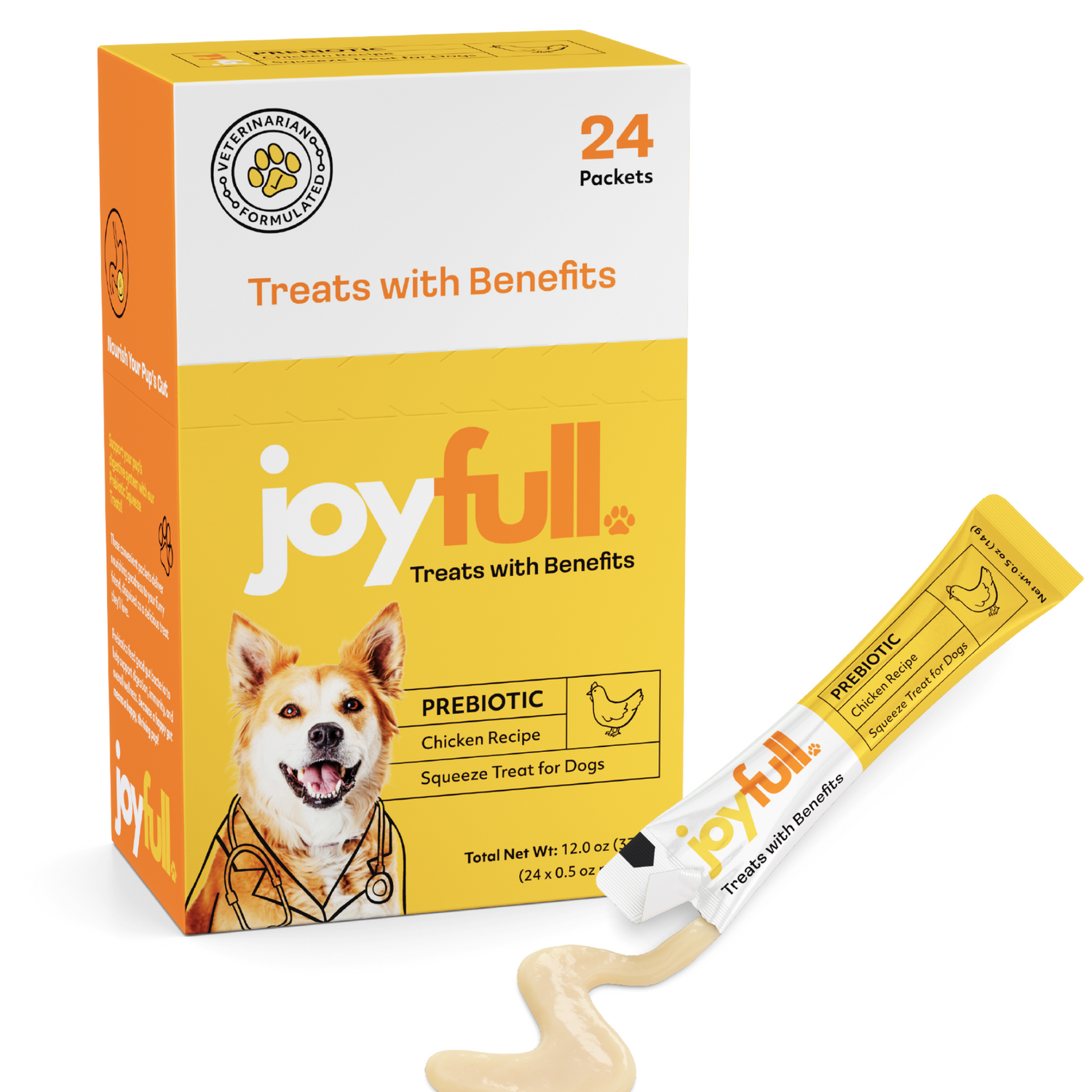
Best Supplements for Cats: Support Your Feline's Health Today
When it comes to the best supplements for cats, the most effective ones are those that address a specific need. Think of targeted solutions like omega-3s for a healthier skin and coat, glucosamine to support aging joints, or probiotics for better digestive health.
But it's important to remember that a high-quality, balanced commercial cat food is designed to provide everything a healthy adult cat needs. This makes supplements a specialized tool for specific situations, not a daily necessity for every single cat.
Do Cats Actually Need Supplements?
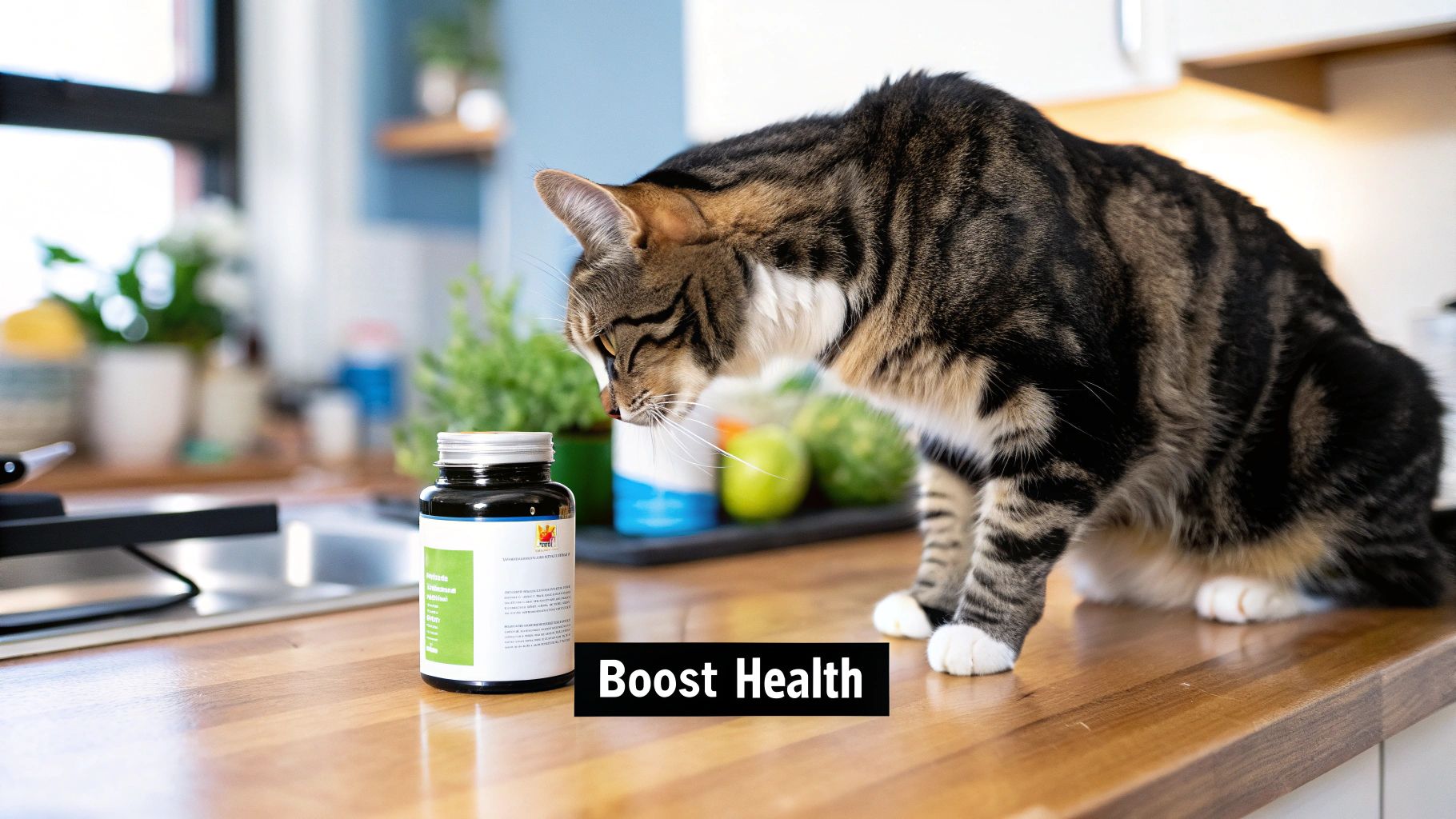
It’s the first question on every cat owner's mind: "If my cat's food is already 'complete and balanced,' why would they need anything extra?" That's a great question.
Think of your cat's daily diet as the foundation of their health. For most healthy, adult cats, a premium commercial food really does cover all the bases. Supplements aren't meant to replace a good diet. Instead, they act as boosters, stepping in to fill specific nutritional gaps that can pop up due to age, certain health conditions, or even just your cat's unique lifestyle.
It's a lot like how a person might take extra Vitamin D during the darker winter months. Your cat might need a little extra support for their joints as they enter their golden years, and that's where a supplement can make a real difference.
When to Consider Supplements for Your Cat
So, how do you know if your cat could benefit from a supplement? It all starts with paying close attention to their behavior, appearance, and overall well-being. Being proactive can dramatically improve their quality of life, especially since certain life stages and health issues can increase their need for nutrients beyond what their food provides.
Here’s a quick reference table to help you spot situations where a supplement might be a good idea.
When to Consider Supplements for Your Cat
| Life Stage or Condition | Signs to Watch For | Supplements to Discuss with Your Vet |
|---|---|---|
| Senior Cats (7+ years) | Slowing down, stiffness after naps, difficulty jumping | Glucosamine, Chondroitin, Omega-3s (for joints and cognitive function) |
| Digestive Issues | Frequent vomiting, diarrhea, constipation, or gas | Probiotics, Prebiotics, Digestive Enzymes |
| Skin & Coat Problems | Dull fur, excessive shedding, dry or flaky skin, constant scratching | Omega-3 & Omega-6 Fatty Acids (from fish oil or flaxseed) |
| Anxiety & Stress | Hiding, over-grooming, changes in litter box habits, increased vocalization | L-theanine, Tryptophan, Calming Pheromones |
| Diagnosed Health Conditions | (e.g., Kidney disease, arthritis, allergies) | Vet-prescribed therapeutic supplements tailored to the specific condition |
Remember, this table is just a starting point. Your veterinarian is the ultimate resource for diagnosing any issues and recommending the right course of action.
The trend of supplementing our pets' diets is definitely growing. In fact, the global pet supplements market was valued at around USD 2.66 billion and is expected to keep climbing as more owners look for ways to help their pets live longer, healthier lives. You can find more details on the pet supplements market on towardsfnb.com.
The key takeaway here is to enhance your cat's nutrition, not overhaul it. Before you add anything new to their routine, the most important step is to talk with your vet. They can run tests, pinpoint the exact need, and make sure any supplement you're considering is safe and won't interact with other medications. This partnership is the best way to give your cat effective, targeted support.
A Practical Guide to Cat Supplement Categories
Diving into the world of cat supplements can feel a bit like navigating a maze. There are so many bottles with different ingredients and big promises on the labels. It's easy to get lost. But if you can get a handle on the main categories, you'll be able to cut through the noise and figure out what your cat might actually need.
Let's break it down by the job each supplement does inside your cat's body. This isn't about memorizing ingredients; it's about understanding the purpose. Think of this as your foundational guide to having a more productive, confident chat with your veterinarian. We'll group them into four key areas.
This image gives a great visual overview of some common nutritional gaps that supplements can help fill.
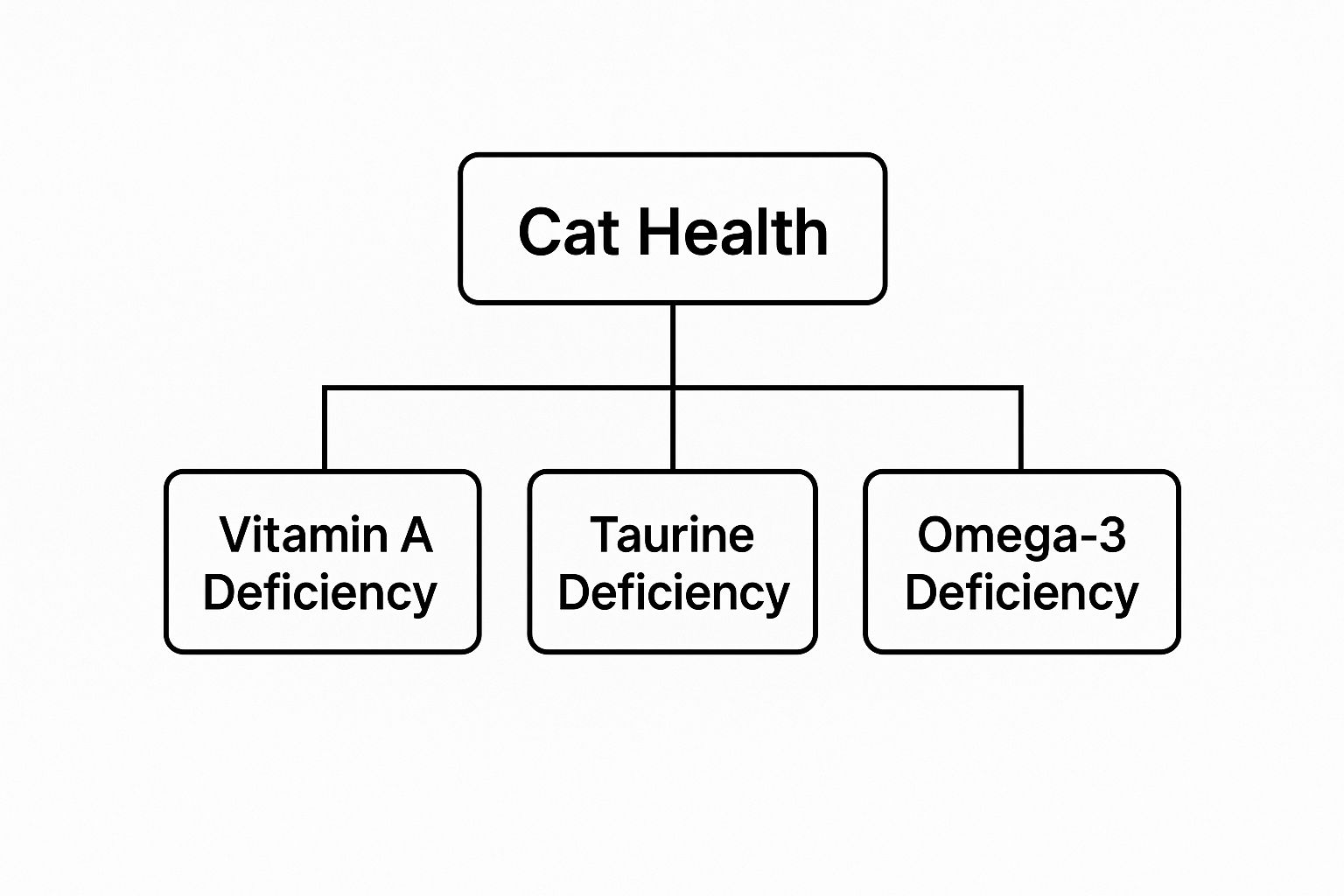
As you can see, nutrients like Taurine, Omega-3s, and Vitamin A are non-negotiable for a cat's health. When their daily diet falls short, supplementation can be a real game-changer.
Joint Support Supplements
Picture your cat’s joints as the hinges on a well-used door. Over years of pouncing, leaping, and chasing, those hinges can start to get a little stiff and creaky. Joint supplements are the lubricating oil that keeps them moving smoothly.
The superstars in this category are Glucosamine and Chondroitin. These aren’t foreign chemicals; they’re natural components of cartilage—the spongy, flexible tissue that cushions the bones within a joint.
- Glucosamine: This is a builder. It helps repair and form new cartilage.
- Chondroitin: This is a shock absorber. It helps cartilage hold water, keeping it elastic and bouncy.
If you've noticed your senior cat thinking twice before jumping onto the couch, it's often a sign that those "hinges" are feeling the strain. Giving them these building blocks can make a real difference in their comfort and mobility, helping them stay playful and agile.
Skin and Coat Enhancers
A cat's coat isn't just for show; it's a direct reflection of their overall health. If you're seeing a dull coat, flaky skin, or constant scratching, it could be a sign that something's missing from their diet. This is where skin and coat supplements, especially Omega Fatty Acids, shine.
Think of your cat's skin as a brick wall. The Omega-3 and Omega-6 fatty acids are the mortar holding those bricks together, creating a strong, hydrated barrier against the world.
These essential fatty acids are fantastic for their anti-inflammatory properties. This is why they are often one of the best choices for cats with allergies, as they help calm irritated skin and reduce itching from the inside out.
Fish oil is a particularly potent source of Omega-3s, delivering EPA and DHA in a form that a cat's body can put to work immediately.
Digestive Aids
Your cat’s gut is a complex ecosystem, a lot like a garden. For that garden to thrive, you need plenty of good plants (beneficial bacteria) to crowd out the weeds (harmful bacteria). This is precisely the job of probiotics.
Probiotics are live, friendly microorganisms that help restore and maintain that healthy balance in the gut. They are incredibly helpful during stressful times, after a round of antibiotics, or for cats who just seem to have sensitive stomachs prone to diarrhea or constipation. As you look for ways to support your cat's health, you might also consider the role of high protein cat treats.
Immune System Boosters
Finally, some supplements are designed to reinforce your cat's natural defense system. The most well-known in this group is Lysine, an essential amino acid. It’s frequently recommended for cats, especially those dealing with the Feline Herpesvirus (FHV-1), which is a very common cause of "cat colds" and upper respiratory infections.
Lysine works in a clever way—it interferes with the virus's ability to replicate. This can help reduce how often flare-ups occur and make them less severe when they do, meaning less sneezing and fewer watery eyes. It’s a simple but effective ally for the immune system, helping it keep viral troublemakers in check.
Helping Your Cat Stay Agile with Joint Supplements
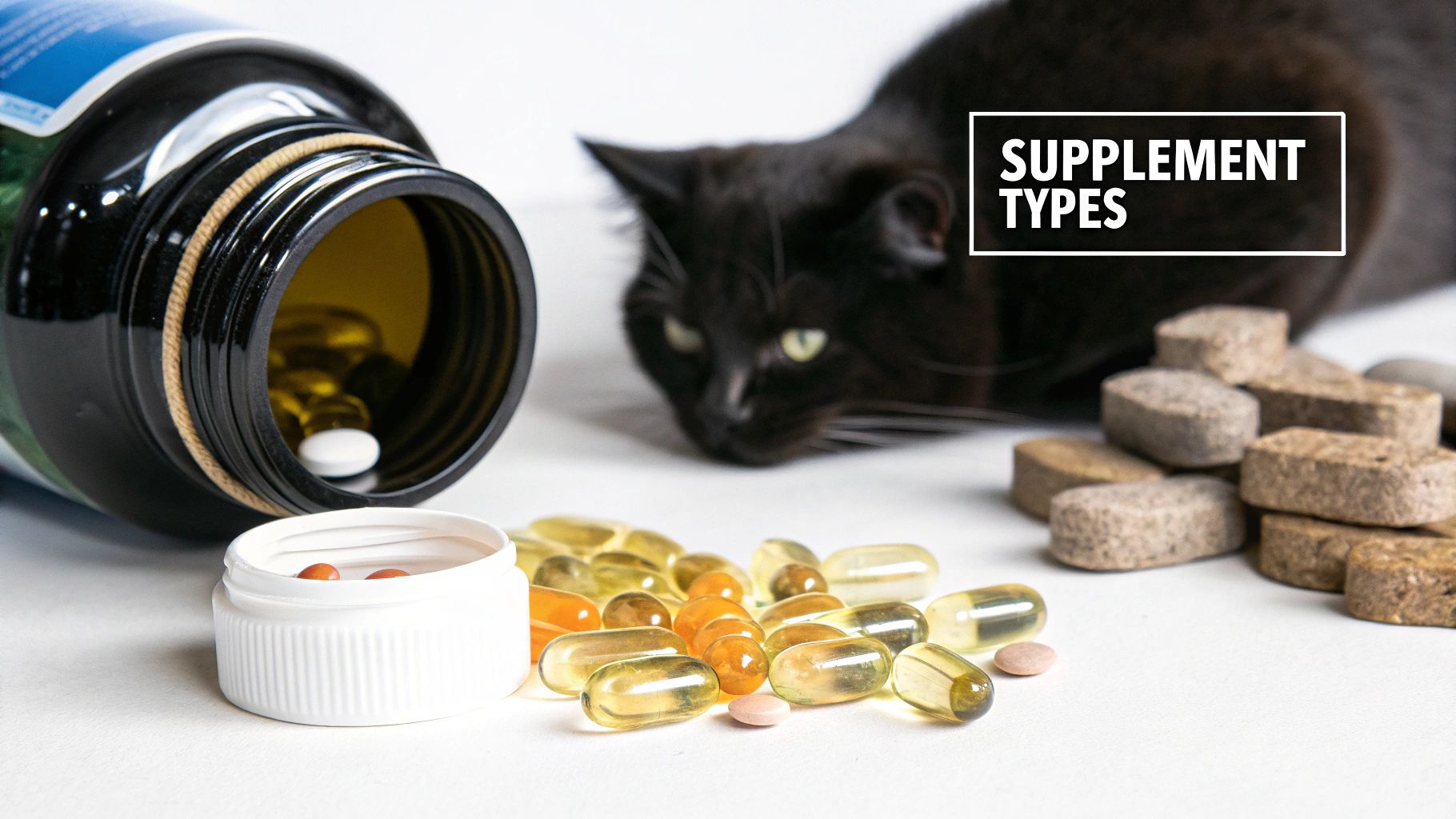
Cats are absolute masters of graceful movement, but even their incredible agility can diminish over time. Joint stiffness often sneaks up so quietly that we, as their owners, barely notice it at first. Maybe your cat who once vaulted to the top of the bookshelf now pauses to think about it, or their playful pounces seem a bit more planned out and less spontaneous.
These subtle shifts are easy to overlook, but they're often the first whispers of joint discomfort. You might also notice your cat isn't grooming hard-to-reach spots as thoroughly or seems a little less keen on being picked up. Think of their joints like the intricate gears in a finely-tuned machine; after years of use, they just need a little extra support to keep everything running smoothly.
The Building Blocks of Healthy Joints
The best joint supplements for cats essentially act like a maintenance crew for their cartilage—that smooth, rubbery tissue that cushions the bones and keeps them from rubbing together. In this world, two ingredients stand out as the heavy hitters: glucosamine and chondroitin.
These aren't some foreign chemicals; they're compounds naturally found in the body that are crucial for keeping joints healthy.
- Glucosamine: This is the primary "builder." It helps the body produce the molecules needed to form and repair cartilage, providing the raw materials to keep the joint structure sound.
- Chondroitin Sulfate: Think of this one as a "moisture magnet." It helps cartilage absorb and hold water, which is vital for shock absorption and keeping the joint lubricated and flexible.
When you put them together, they create a powerful partnership that slows down cartilage deterioration while supporting its natural repair process. This one-two punch is why they're so often recommended as one of the best supplements for cats dealing with age-related stiffness. With an estimated 46.5 million cats living in U.S. households in 2023–2024, it's no surprise that glucosamine and chondroitin have become go-to choices for owners focused on their pet's mobility. Learn more about the rising interest in pet wellness.
Choosing a Format Your Cat Won't Refuse
Knowing what ingredients to look for is the easy part. The real challenge? Finding a supplement that your cat will actually take. Cats are notoriously picky, and what works for one might get a hard pass from another.
Fortunately, manufacturers get it, and joint supplements now come in several cat-friendly forms:
- Soft Chews: These are a huge win for many cats. Often flavored with fish or chicken, they feel more like a daily treat than medicine.
- Liquids: A fantastic option for fussier felines. You can easily mix a few drops into their wet food, and they’ll likely never know it's there.
- Powders: Just like liquids, powders can be sprinkled over wet or even dry food. Most are designed to be tasteless and odorless, making them perfect for stealthy administration.
The best supplement in the world is useless if your cat won't touch it. Don't get discouraged if your first attempt is a flop. It can take a bit of trial and error to discover what your cat prefers.
Smart Tips for Giving Joint Supplements
Introducing anything new to a cat's routine requires a bit of finesse. The goal is to make it a positive, stress-free experience for everyone involved.
Here are a few tricks I've learned over the years:
- Start slow and steady: Don't go in with the full dose on day one. Begin with just a quarter of the recommended amount mixed into their favorite food, then gradually increase it over a week.
- Bring out the good stuff: Mix the supplement with something they find irresistible. A little bit of tuna in water, some plain meat-based baby food (just be sure it has no onion or garlic powder!), or their favorite lickable treat can work wonders.
- Make it a routine: Consistency is your best friend. Try to give the supplement at the same time every day, like with their breakfast. This helps it become just another normal part of their day.
Patience is everything. It can take anywhere from four to eight weeks of daily use before you start to see a real difference in your cat's comfort and mobility. But seeing them leap and play with renewed confidence is worth every bit of the effort.
Achieving a Healthy Coat with Omega Fatty Acids
A cat's coat isn't just for show—it's a window into their overall health. If you've noticed their fur looking dull, flaky, or dry, it’s often a sign that something is off on the inside. This is where Omega fatty acids come in, playing a huge role in bringing back that beautiful, healthy sheen.
Think of your cat's skin as a brick wall protecting their body. Omega-3 and Omega-6 fatty acids are the mortar holding those bricks together, keeping the wall strong and moisturized. These are essential fats, meaning your cat’s body can’t make them on its own, so they have to get them from food or supplements.
But these powerful nutrients do more than just make a coat shiny. Their real claim to fame is managing inflammation. This is a game-changer for cats with allergies, which often show up as itchy, irritated skin and constant scratching.
The Power of EPA and DHA
When you start shopping for Omega supplements, you'll see a lot of acronyms, but the two most important ones are EPA (eicosapentaenoic acid) and DHA (docosahexaenoic acid). These are the heavy hitters of the Omega-3 world, found almost exclusively in marine sources like fish oil.
Sure, you can find Omega-3s in plants like flaxseed (as ALA), but cats are notoriously bad at converting ALA into the forms they actually need. It’s a bit like giving someone a block of wood and asking them to build a house without tools. Fish oil, on the other hand, provides EPA and DHA directly, making it far more effective for our feline friends.
- EPA is the skin specialist. It directly targets the inflammatory processes that lead to the itching and misery of skin allergies.
- DHA is brain food. It's crucial for kitten brain and eye development and helps keep senior cats mentally sharp.
By adding these to their diet, you're giving your cat what they need to soothe irritated skin, cut down on excessive shedding, and build a stronger skin barrier to fend off allergens.
A strong skin barrier is your cat’s first line of defense. When fortified with Omega fatty acids, it becomes much more effective at keeping allergens and irritants out, which can significantly reduce flare-ups for sensitive cats.
How to Choose a High-Quality Fish Oil
Not all fish oils are created equal, and picking a good one is key for getting results safely. The market can be overwhelming, but you can spot a quality product by looking for a few specific things.
Purity should be your number one concern. Fish can absorb toxins like mercury from the water, so you want a product that has been purified. Always look for brands that use third-party testing to screen for heavy metals and other contaminants.
Here’s a quick checklist for finding the best fish oil for your cat:
- Source: Look for oils made from small, cold-water fish like sardines, anchovies, or krill. They're lower on the food chain, so they accumulate fewer toxins.
- Form: Fish oil for cats usually comes in a liquid pump bottle or in capsules. Most cat owners find the liquid is easiest—you just mix it right into their wet food.
- Preservation: Good fish oil is delicate and can go rancid. Top-tier products use natural antioxidants like Vitamin E (tocopherols) to stay fresh. Steer clear of anything with artificial preservatives.
Getting your cat started is simple. Just add a small amount to their favorite meal. If you're looking for more ways to boost their nutrition, our guide on creating healthy homemade cat treats has some great ideas. Remember to start slow and work up to the full dose to give their tummy time to adjust.
Nurturing a Healthy Gut With Probiotics
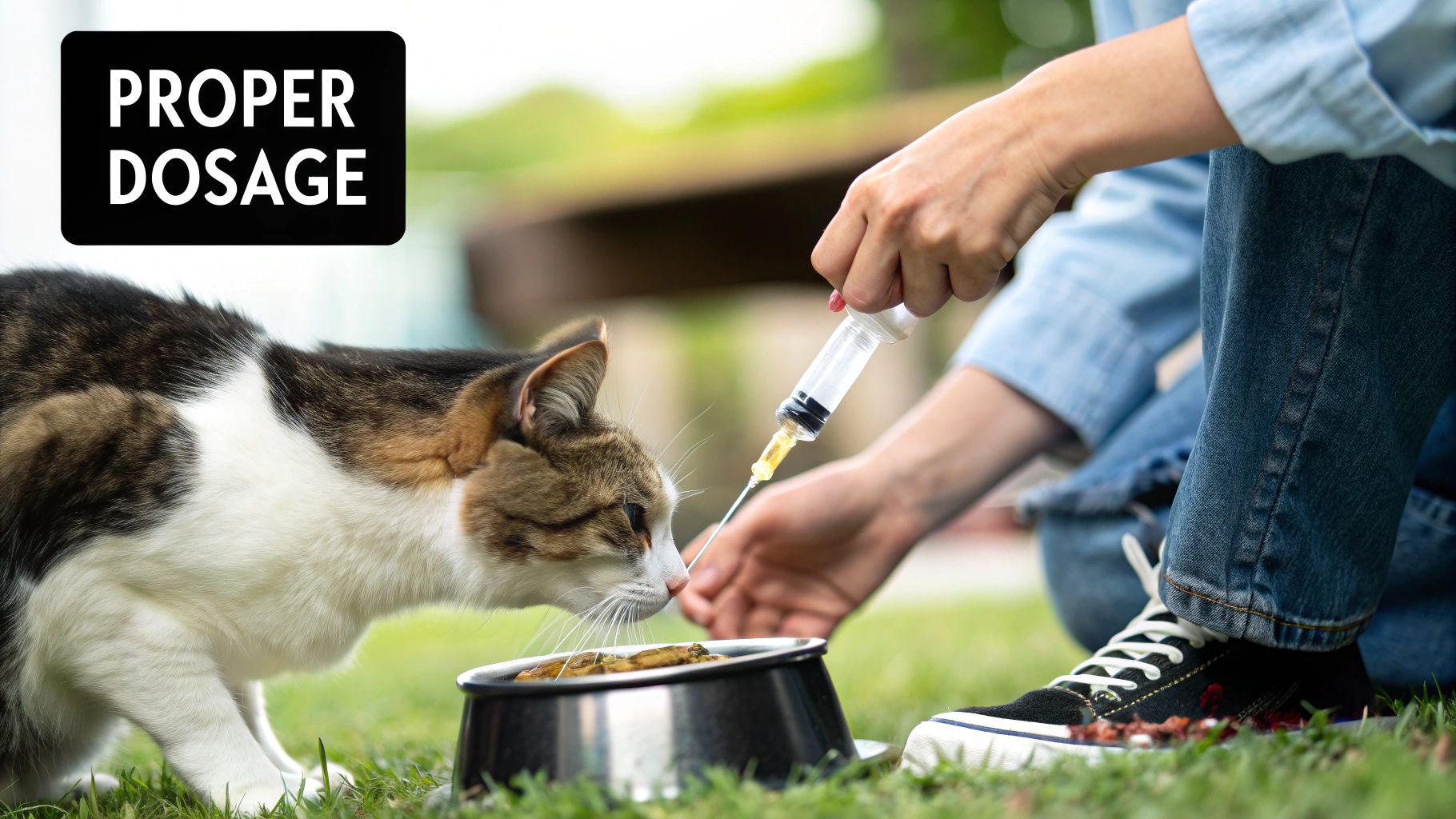 Think of your cat's digestive system like a garden. For it to thrive, it needs a perfect balance of organisms. This delicate internal ecosystem, the gut microbiome, is teeming with billions of bacteria—some good, some not so good. When everything is in harmony, digestion works like a charm, nutrients get absorbed properly, and your cat’s immune system stays strong.
Think of your cat's digestive system like a garden. For it to thrive, it needs a perfect balance of organisms. This delicate internal ecosystem, the gut microbiome, is teeming with billions of bacteria—some good, some not so good. When everything is in harmony, digestion works like a charm, nutrients get absorbed properly, and your cat’s immune system stays strong.
But things can get thrown off balance. Stress, a round of antibiotics, or a sudden change in food can disrupt this harmony, letting harmful bacteria get the upper hand. That’s when you start seeing problems like diarrhea, constipation, and gas. This is exactly where probiotics, easily one of the best supplements for cats, come in to save the day.
Probiotics are essentially live, "friendly" bacteria that help replenish the gut's population of good microbes. They're like reinforcements for your cat's internal garden, helping to crowd out the weeds and keep everything running smoothly.
The Dynamic Duo: Probiotics and Prebiotics
You'll often hear "prebiotics" mentioned in the same breath as probiotics, and for good reason. They're a powerhouse team for your cat's digestive health.
- Probiotics: These are the live beneficial bacteria themselves—the active workers that set up camp in the gut and get to work.
- Prebiotics: This is a special type of plant fiber that acts as food for those good bacteria. Think of prebiotics as the fertilizer that helps the probiotic "seeds" grow and thrive.
When a supplement contains both, it's called a synbiotic, and it provides a complete approach to gut health. You're not just adding new good bacteria; you're also feeding the ones already there, creating a robust environment for digestive wellness. For cats with persistent tummy issues, pairing a supplement with the best cat food for a sensitive stomach can make a world of difference.
Decoding the Probiotic Label
Picking a good probiotic isn't as simple as grabbing the first box you see on the shelf. To make sure you’re getting a product that will actually work, you have to play detective and look closely at the label.
Understanding what you're buying is crucial for success. The label tells you everything—which specific bacteria are included, how potent the supplement is, and whether it’s designed to survive the acidic journey to your cat's gut.
Two of the most important things to look for are the bacterial strains and the CFU count.
How to Choose the Right Probiotic
Choosing a probiotic can feel overwhelming with so many options out there. This table breaks down the key features to look for on the label so you can make an informed choice for your cat's health.
| Feature to Check | What It Means | Why It's Important for Your Cat |
|---|---|---|
| Specific Strains Listed | The label names the exact types of bacteria, like Enterococcus faecium or Bifidobacterium animalis. | Not all bacteria are the same. You want strains that have been studied and proven to be beneficial for cats, not generic ones. |
| CFU Count | CFU stands for Colony-Forming Units and measures the number of live, active bacteria per dose. | This tells you the potency of the supplement. A higher CFU count isn't always better, but you need a sufficient amount to be effective. |
| Guaranteed Analysis | The manufacturer guarantees the CFU count is accurate through the product's expiration date. | Bacteria are living organisms and can die off. This guarantee ensures the product is still potent when you use it. |
| Delivery System | This refers to how the bacteria are protected (e.g., microencapsulation) to survive stomach acid. | The bacteria need to reach the intestines alive to do their job. Without protection, most will be destroyed by stomach acid. |
By checking for these key details, you can be confident you're selecting a high-quality supplement that will provide real digestive support.
Globally, digestive support supplements are consistent best-sellers, which tells us that cat owners are prioritizing their pets' quality of life more than ever. This focus on proactive wellness is driving steady growth in the pet supplement market.
By supporting your cat’s gut with the right probiotics, you're doing more than just fixing an upset stomach. You’re building their health from the inside out. A balanced microbiome is directly linked to a stronger immune system and better nutrient absorption, making it a true cornerstone of your cat's overall well-being.
How to Choose and Give Supplements Safely
Walking down the pet aisle can feel overwhelming. With so many bottles and promises, how do you actually pick the right supplement for your cat? It's about becoming a smart shopper and learning to read between the lines on the label. This is how you find something that's not just effective, but genuinely safe for your best friend.
Your first move should always be to flip the product over and get familiar with the ingredient list. You're looking for clarity and transparency. A good brand will tell you exactly what's inside and in what amounts. Red flags? Vague phrases like "proprietary blend," which can sometimes be a clever way to hide the fact that the good stuff is only in there in tiny, unhelpful amounts.
Look for a Seal of Approval
One of the quickest ways to spot a trustworthy supplement is to look for a quality seal on the package. Think of it as a stamp of approval that shows the company has done its homework to prove its product is safe and well-made.
In the United States, the gold standard is the NASC Quality Seal. The National Animal Supplement Council (NASC) is a non-profit organization that holds animal supplements to a much higher standard. To earn that seal, a product has to pass a tough third-party audit that checks everything from where the ingredients come from to the final manufacturing process. It’s a clear signal that the company behind the product actually cares about quality.
When you see the NASC Quality Seal, it’s a shortcut to peace of mind. It tells you the product has met strict rules for quality, safety, and consistency in an industry that isn’t heavily regulated.
Mastering the Art of Giving Supplements
Okay, you've found a great supplement. Now for the real test: convincing your cat to take it. We all know how… particular… cats can be. Turning supplement time into a battle of wills is stressful for everyone, so the goal is to make it as positive (or at least as painless) as possible.
Luckily, you've got a few tricks up your sleeve. The secret is figuring out what clicks with your cat's unique personality and tastes.
Tips for Stress-Free Supplementing:
- Mix it with a High-Value Food: This is the classic approach for powders and liquids. Don't just dump it in their regular kibble. Instead, mix the supplement into a small spoonful of something they find irresistible—a bit of tuna in water, some plain meat baby food, or a creamy lickable treat. Offer this special "starter" before their main meal when they're most hungry.
- Use Pill Pockets: These things are a game-changer for pills and capsules. They're soft, delicious treats with a little pouch in the middle designed to hide a pill completely. The strong, tasty flavor usually does a fantastic job of masking any "medicine" smell or taste.
- Choose Palatable Chews: Many of the best supplements for cats now come formulated as soft, flavored chews. Since they often taste like chicken or fish, your cat might just think they're getting a daily treat. This is often the path of least resistance and the most enjoyable option for you both.
- Start Small and Go Slow: Don't just jump in with the full dose on day one. Introduce the new supplement by giving just a tiny fraction of the recommended amount. Over the next week, slowly work your way up to the full dose. This lets your cat get used to the new taste and smell without getting suspicious.
At the end of the day, patience is your best tool. You might have to try a few different methods to find the one that works, but once you establish a calm and consistent routine, it’ll just become another simple part of your day together.
Common Questions About Cat Supplements
Diving into the world of feline supplements can feel a bit overwhelming, and it's natural to have questions pop up along the way. Even after you feel you've got a handle on the basics, a few uncertainties might remain. Let's tackle some of the most common questions I hear from cat owners to help you feel completely confident about supporting your cat's health.
Can I Give My Cat Human Supplements?
This comes up all the time, and the answer is a hard no. It might seem like a simple shortcut, but giving your cat a supplement made for humans is a really bad idea.
Think about it: the dosages are calculated for a 150-pound person, not a 10-pound cat. What's a normal dose for you could easily be a toxic overdose for your furry friend. On top of that, many human supplements contain ingredients that are perfectly safe for us but dangerous for cats. A classic example is xylitol, an artificial sweetener in many vitamins and gummies that is extremely poisonous to pets. Always, always stick to products made specifically for cats.
How Long Until I See Results from a Supplement?
This is where a little patience goes a long way. The time it takes to see a noticeable difference really depends on what you're trying to achieve.
- Quick Relief: If your cat has a temporary tummy upset and you start a probiotic, you might see things get back to normal within a few days as their gut bacteria rebalances.
- Long-Term Support: For chronic issues, like using glucosamine for stiff joints, you're playing the long game. It often takes four to eight weeks of consistent daily use before you'll see a real improvement in your cat's comfort and mobility.
Supplements aren't magic pills; they're about providing steady, ongoing support. Sticking with it every day is what truly makes the difference.
Are There Any Risks with Cat Supplements?
Yes, absolutely. This is why using them correctly is so important. When it comes to supplements, more is definitely not better. Overdoing it with certain vitamins and minerals—especially fat-soluble ones like vitamins A, D, E, and K—can cause them to build up in your cat's body and lead to toxicity.
It’s also crucial to remember that some supplements can interfere with prescription medications your cat might be taking.
This is exactly why you should never start a new supplement without talking to your vet first. Your veterinarian understands your cat’s entire health picture. They can spot potential drug interactions and recommend a safe, effective product and dose that’s right for your individual cat.
Is It Possible to Over-Supplement My Cat?
You bet. It’s a common mistake to think that if a little bit is good, a lot must be fantastic. In reality, piling on too many supplements can throw off the precise nutritional balance in your cat's regular food and cause some serious health issues down the line.
Always follow the dosage instructions on the package unless your vet specifically tells you otherwise. A high-quality, balanced diet is the foundation of good health. Supplements are just tools we use to target specific needs, not replace a solid nutritional base.
At Joyfull, we believe your pets deserve the very best. Our supplements are crafted with clean ingredients and high-quality proteins, all rigorously reviewed by our veterinary advisor to ensure they are both safe and genuinely beneficial. Give your cat the gift of enhanced wellness by exploring our products at https://joyfullpet.com.
